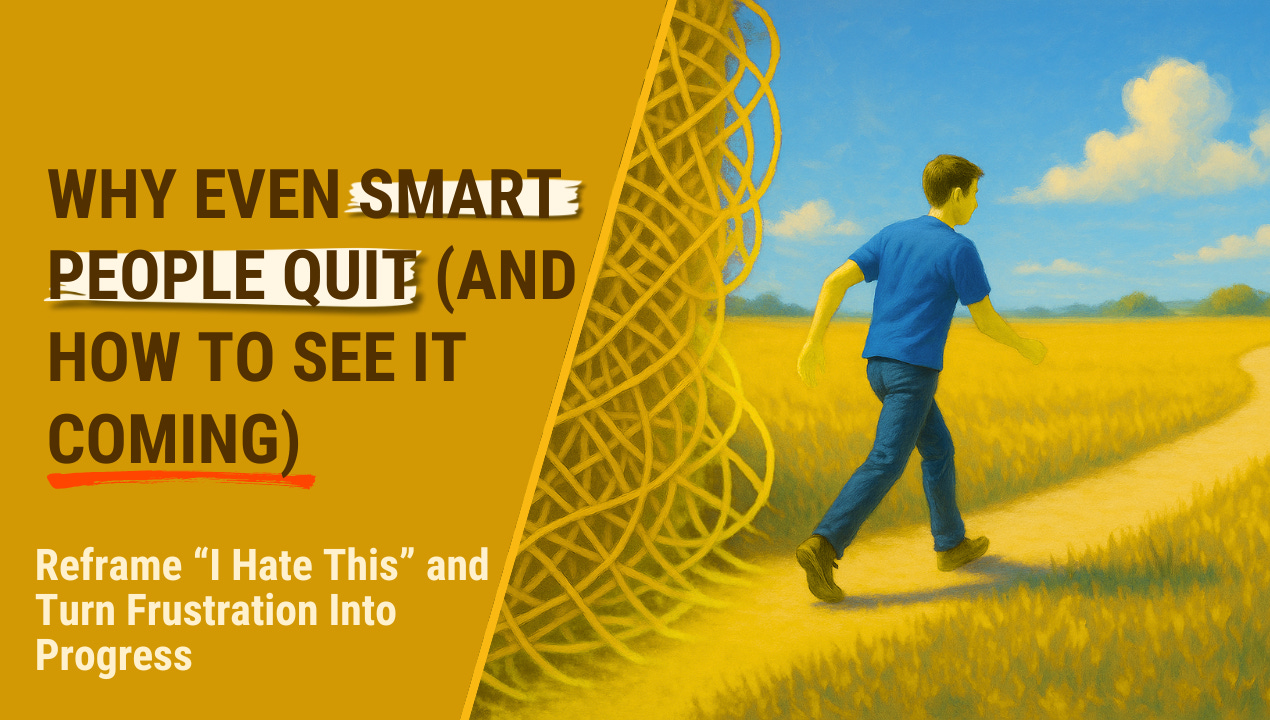Why Even Smart People Quit (and How to See It Coming)
Reframe “I Hate This” and Turn Frustration Into Progress
Welcome to Linked And Lift, your weekly guide to thriving in your career and designing a life you love for entrepreneurs and ambitious professionals. Each week, you get research-backed insights and we break down the skills, strategies, and mindsets you need to stay ahead of the curve.
I’m always refining this newsletter to make sure you get the most useful, relevant insights for your growth.
Take 15 seconds here to make sure the next editions speak directly to you.
What’s Inside This Edition:
Why people don’t quit because it’s hard.
The hidden emotion behind “I hate this” (in teens, leaders, and founders alike)
The precise moment when everything shifts: from helplessness to agency
A closing thought to help you recognise powerlessness before it becomes permanent
If you’ve ever heard someone say they hate something, or said it yourself, when something deeper was really going on, this one’s for you.
What No One Tells You About Why We Really Quit
I’ve heard it hundreds of times over the past 14 years, in my work with high school teens and women leaders.
The words are different, but the weight is the same:
“I hate this.”
And here’s what I’ve learned after sitting with that statement in classrooms, coaching sessions, and quiet conversations:
People don’t hate the thing.
They hate how it makes them feel.
The Hidden Language of Powerlessness
When your high school teen says, “I hate French,” they’re rarely talking about the language itself.
What they’re really saying is:
“I hate feeling lost while everyone else nods along.”
“I hate raising my hand and hearing myself stumble.”
“I hate studying for hours and still failing the test.”
“I hate how my accent sounds compared to the fluent kids.”
“I hate working this hard and feeling this stuck.”
When a founder says, “I hate LinkedIn,” they’re often saying:
“I hate posting and hearing crickets.”
“I hate watching others grow while I stay invisible.”
“I hate not knowing if my message matters.”
“I hate feeling like an imposter in my own expertise.”
“I hate how much effort I’m putting in with so little return.”
The pattern is universal.
What sounds like hatred is actually helplessness wearing a sharper mask.
Because when you work hard and still feel behind,
when you show up and don’t see results,
when you try and it doesn’t land,
it’s easier to say “I hate it” than to say:
“I’m struggling, and I don’t know how to fix it.”
The Moment Everything Shifts
I’ve witnessed this transformation more than a hundred times now.
There’s a precise moment when the “hate” dissolves.
For the student, it happens when:
The irregular verb pattern that felt impossible suddenly clicks
The sentence structure that seemed random starts to make sense
The oral exam that filled them with dread becomes something they can actually prepare for
For the founder, it happens when:
Her content finally starts to resonate and she sees genuine engagement
She finds her voice and audience.
She identifies exactly who she’s speaking to, and why they need to hear from her
In both cases, the shift isn’t about innate talent appearing out of nowhere.
It’s about reclaiming agency.
It’s the moment they stop feeling done to by the process
and start feeling in control of it.
What This Means for You
You’re already leading at home, at work, and in your business.
You know when “fine” doesn’t mean fine.
When hesitation signals something deeper than the surface objection.
And “I hate it” might not mean what it sounds like.
So next time you hear it from your child, partner, or even yourself…
Pause.
Ask:
What am I really feeling?
Where do I feel powerless right now?
Because most of the time, resistance isn’t about the task.
It’s about how the task makes us feel about ourselves.
And the real growth begins when we reclaim agency.
Linked And Lift Picks
Book: Mindset: The New Psychology of Success by Carol Dweck – A deep dive into how we interpret struggle shapes whether we persist or quit.
Podcast: The Growth Equation – Episodes on resilience and reframing failure.
Quote: “It’s not that I’m so smart, it’s just that I stay with problems longer.” – Albert Einstein
Closing Thought
Your child doesn’t need to love French.
They just need to stop feeling defeated by it.
You don’t need to love LinkedIn.
You just need to stop feeling invisible on it.
The antidote to “I hate this” isn’t love.
It’s moving from powerlessness to agency.
It’s about understanding the voice underneath the frustration and
giving it a chance to be heard.
The next time you hear someone say they hate something, listen closer.
You might just hear a breakthrough trying to speak.
📩 Share the Lift: Know someone who needs this message? Share this newsletter with them to help them.
⭐ Rate This Edition: Your feedback shapes Linked And Lift! Let me know what you want to see more of.
👉 Have you ever said “I hate this” when what you really meant was “I feel lost here”?
👇 Hit reply and tell me what was really going on. I’d love to hear your story.
And thank you for being a part of our Linked And Lift community!
Until next time,
Veronique Barrot
Founder, Linked And Lift
Coaching leaders to grow inside out.
Follow me on LinkedIn where I share self-leadership and growth insights Monday to Friday.
P.S. If you’re wondering what I do beyond writing newsletters: I support ambitious women leaders in two ways: through strategic personal branding for founders, and helping their teens go from “I’m not a language person” to earning A–A* in IGCSE, O Level & A-Level French exams. Both are about the same thing: rebuilding foundations that were never quite solid. If that’s relevant to your world, I’m here.













